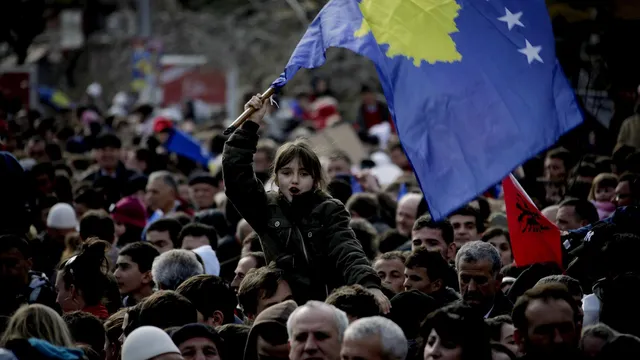Voters in Kosovo are called to vote today (9th of February) to elect their 120 MPs. Even if outgoing Prime Minister Albin Kurti's victory looks certain, her problem will be an indication of the popularity of his hardline policy towards Serbia, AFP reports.
"This is a historic referendum," Kurti said at his last rally on Friday night in Pristina, the capital of the territory that broke away from Serbia in 2008.
Albin Kurti and his Self-Determination Movement party campaigned on a promise to govern Kosovo "from one end to the other", that is, even in Serb-majority territories where Belgrade's influence is far more tangible than that of Pristina.
In recent months, the prime minister-designate has been closing many parallel states (banks, post offices, administrations) that Serbia has been funding to ensure the loyalty of the Serb minority.
These closures, widely reported in the press, could provide the Self-Determination Movement with a big victory last: rare polls attribute 40 to 50% of the vote to the party in a fragmented parliament. In 2021, Self-Determination won 50.28% of the vote, edging out the Democratic Party of Kosovo (PDK) by 17%.
Formed by former fighters involved in the war against Serbian forces, the PDK dominated political life from the time of independence in 2008 until 2019, before some of its leaders were brought to international justice for crimes committed during the conflict against Serbia in the late 1990s.
Of the 20 seats reserved for minorities, all 10 allocated to the Serbian minority were won by the Serbian List in 2021. The rating of that party, considered by Pristina to be Serbia's armed wing, will also be scrutinised by the authorities.
Frequent tensions
"A vote for the Serbian List means a vote for the Serbian state," Zlatan Elek, leader of that party, said in an interview this week. "Every Serb who does not vote tomorrow, or who votes against the Serbian List, will de facto give his vote to Kurti and those who obey him," he added.
Serbian President Aleksandar Vucic also called to vote for the Serbian List candidates, "the only guarantors that Kurti will not expel Serbs from Kosovo."
Asked about the possibility of Kosovo authorities preventing some Kosovo Serb voters living in Serbia from coming to vote, Vucic tried to reassure them.
"We have been talking until late last night with representatives of the Quintet (France, Germany, Italy, Britain, USA, ed.). We have received a promise that this will not happen."
The years of Kurti's rule have been marked by frequent tensions with the Serbian minority and with Belgrade, especially after the failure of talks organised by the low-key alliance in 2023.
That May, dozens of NATO peacekeepers were wounded in clashes with Serbs. In September 2023, a commando unit of heavily armed Serbs killed a Kosovo police officer before hiding for several hours in a monastery and then fleeing on foot into Serbia. In late November 2024, tensions rose again against a vital pipeline of Kosovo's electrical infrastructure.
This has not swayed Kurti in his policy of firmness towards Serbia, even if it means provoking the international community, which accuses him of saying no to any dialogue.
Albin Kurti "is regularly accused by the opposition of not doing enough, of alienating the international community, and of complaining about Serbia while missing opportunities to build Kosovo's infrastructure and economic development," recalls Jonathan Moore, an expert at the Atlantic Council's Low Center.
Polling stations open at 07:00 and will close 12 hours later. The first results should be released shortly after that. I BGNES

 Breaking news
Breaking news
 Europe
Europe
 Bulgaria
Bulgaria







